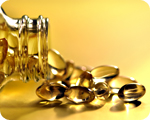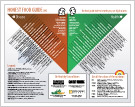
(Natural News) Before you start digging in your latest take-out purchase and taking a sip out of your soda can, it would be wise to make sure that you aren’t exposing yourself to plastics that contain toxic chemicals. Bisphenols are a group of industrial chemicals used to manufacture plastics and resins. Bisphenol-A (BPA), the most infamous of the lot, is found in a large number of hard plastics which we use every day. Products that contain BPA include water bottles, dental fillings, food containers and even sports equipment. Now, experts are claiming that exposure to these chemicals could bring harmful effects to your overall health. Here’s everything you need to know about bisphenol-A (and ways to avoid exposure).
What makes bisphenol bad?
One of the main sources of BPA exposure is through your diet. When BPA products are made, not all of the chemicals are sealed into the product. This allows these chemicals to break free and seep into the container’s contents. For example, a study published in Environmental Health Perspectives found that BPA levels in urine decreased by 66 percent after participants avoided packaged food for three days. But what exactly makes it bad?
According to the Environmental Protection Agency, there is concern towards BPA because it is a “reproductive, developmental, and systemic toxicant in animal studies and is weakly estrogenic, there are questions about its potential impact particularly on children’s health and the environment.”
Plenty of research has associated this chemical to a variety of health conditions in both human and animal studies. A study published in the journal Reproductive Toxicology found that exposure to BPA could affect the male reproductive system, brain and even metabolic provinces. Another study, conducted by Japanese researchers, linked exposure to BPA to recurrent miscarriages.
 |
Discover how to prevent and reverse heart disease (and other cardio related events) with this free ebook: Written by popular Natural News writer Vicki Batt, this book includes everything you need to know about preventing heart disease, reversing hypertension, and nurturing your cardiac health without medication. Learn More. |
Ways to avoid BPA exposure
Because BPA exposure could lead to a myriad of negative health effects, it is important to develop strategies to reduce, if not completely avoid, your overall BPA exposure. Below you can find a few tips that can help you keep your exposure to this endocrine disruptor at an all-time low. (Related: Bisphenol A chemical commonly found in canned soup and food storage plastics.)
- Use glass and cardboard containers over cans. Acidic foods like tomato sauce and canned pasta are known to absorb more BPA from can linings. Because of this, it would be best to choose brands that come in glass containers. You can also use cardboard take-out boxes instead of plastic containers for other types of food.
- Lessen your canned food intake. One of the easiest ways to reduce your exposure to BPA is to simply stop consuming food that comes from cans. Enrich your diet with fresh or even frozen fruits and vegetables, which often contain significantly more nutrients and much fewer preservatives than anything you can find in a can.
- Opt to use glass bottles for your drinks. In the same vein as choosing glass containers for food, you should avoid drinking beverages that come in cans lined with BPA-laden plastic. You can even use reusable containers to reduce the amount of waste you create.
- Avoid microwaving polycarbonate plastic food containers. Many forms of microwaveable foods are packaged in polycarbonate plastic that breakdown and release BPA when exposed to high temperatures.
- Use BPA-free baby bottles. A general rule for plastics is that hard, clear plastic, more often than not, contains BPA. On the other hand, soft or cloudy plastics do not. Many bottle manufacturers nowadays now offer baby bottles free from BPA. However, these products are likely to contain Bisphenol-S or other alternatives so take precautions when using them.
Learn more about bisphenol-A and how it affects your health at Toxins.news.
Sources include:
















